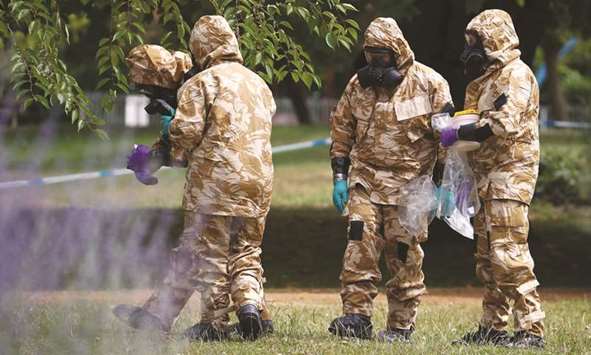The British government is poised to submit an extradition request to Moscow for two Russians suspected of carrying out the Salisbury nerve agent attack that left one person dead and three injured, according to Whitehall and security sources.
The move comes after months of painstaking investigation by hundreds of officers from the police and the intelligence agencies.
They have pieced together the movements of the two Russians, from their entry into the UK through to their departure.
The Crown Prosecution Service (CPS), which prepared the extradition request, has completed the process and is ready to file, the sources said.
The request will reignite the simmering diplomatic row with Russia, which is certain to reject it, prompting another round of tit-for-tat diplomatic expulsions.
Relations between the UK and Russia sank to their lowest point since the end of the cold war after the nerve agent attack on Sergei Skripal, a former colonel in Russian military intelligence, and his daughter, Yulia, in Salisbury in March.
They were found unconscious on a bench in a shopping centre after being exposed to novichok.
UK intelligence chiefs have specifically blamed Russia for the attack.
Charlie Rowley and Dawn Sturgess were subsequently treated for exposure to the nerve agent. Rowley recovered but Sturgess died.
The Kremlin has denied any responsibility and waged a campaign of counter-accusation.
It has suggested that the UK is holding the Skripals against their will and denying them Russian consular assistance.
Any British government request is likely to meet with a scornful response from Moscow.
Russian President Vladimir Putin has previously complained of the UK’s refusal to extradite high-profile critics, including the late oligarch Boris Berezovsky.
The decision to press for extradition follows intense debate within Whitehall, divided between those who want to ratchet up the response to Russia and those who see the request as a futile political gesture.
Putin rejected a similar extradition request in 2007 for two Russians suspected of being behind the 2006 assassination with polonium of the former FSB officer Alexander Litvinenko in London.
A Whitehall source said: “The CPS has been asked to prepare extradition requests and we understand they are ready to go.
“This is Litvinenko all over again. It’s almost a rerun of the situation. The police have managed to identify the people coming over and going back again.”
Police and intelligence officers believe the novichok used to attack the Skripals on March 4 was applied from a perfume bottle sprayed or smeared on to their front doorknob.
Both of them recovered.
Police are working on the assumption that the bottle was dropped somewhere in the city, where it was later picked up by Rowley, who gave it to Sturgess.
The pair were taken to hospital on 30 June.
Sturgess received a much higher dose than the other three after apparently smearing the substance on her wrists, having sprayed it from the bottle.
Rowley’s recovery was helped, according to a source, by one of the first responders being familiar with the nerve agent, having been involved in helping the Skripals.
The Porton Down military defence laboratory near Salisbury has examined the novichok found on the Skripals’ doorknob and the perfume bottle, but police have not yet said whether they are from the same batch.
The Organisation for the Prohibition of Chemical Weapons (OPCW), based in The Hague, which helped with the investigation into the Skripals, sent a team to the UK in July to collect samples from the incident involving Sturgess and Rowley.
The samples were delivered to two OPCW laboratories.
An OPCW spokesperson declined to confirm yesterday whether the novichok was from the same batch.
“The technical assistance is ongoing,” they said.
A source said establishing that the nerve agent is from the same batch is more complicated and time-consuming than is generally assumed.
A security source said the attack on the Skripals was ordered by the GRU, Russia’s military intelligence service, rather than the FSB, which is roughly equivalent to MI5.
Skripal, a former GRU colonel, was turned by the UK overseas intelligence agency, MI6.
The GRU has a history of conducting crude revenge attacks on those who have betrayed it.

People in protective suits collect an item and photograph its location in Salisbury.
